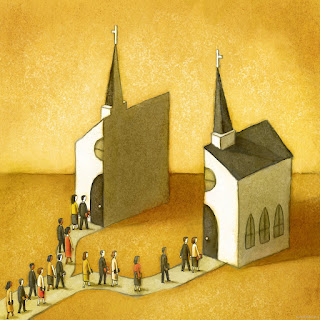Recently I was invited to give a talk to Christians in a graduate counseling program. The topic was "Sexual Identity and Sexual Orientation," which fits with a chapter in my new book, A House Divided. I was glad for the opportunity because I think its important for Christians to understand what sexual minorities are saying and how different Christian groups understand what sexual minorities are saying.
I think it's really important for Christians to understand that sexual identity and spiritual identity are often in conflict within conservative faith communities.
Our sense of self--who we are-- consists of several identities. For example, people might identify themselves based on their marital status (married, living with, single), career type (teacher, electrician, counselor), or parental status (mother, daughter, grandfather).
Two major identities are spiritual and sexual
Identities are multiple and they are not static. We continue to reshape our identities throughout our life.
Spiritual
Most of the people in the world identify as religious or spiritual. The largest religion is Christianity with about 2.2 billion people identifying as Christian. Of these, most are Catholic (about 1.1 billion). For some, their specific faith group is highly important. Others may say, "I'm spiritual but not religious."
Spiritual identity is not static. Although some continue with a child-like faith through much of their life, others grow in their understanding of God and their relationship to God. I've seen youth from fundamentalist homes treat Jesus like a special friend. It's a bit strange to see girls relate to Jesus as a boyfriend--heterosexual guys can't relate like that.
Intelligent Christian youth who attend a Christian liberal arts college will find themselves questioning their faith just as they learn to question other beliefs and ideas. You can't teach young people critical thinking skills and expect them to consider faith off-limits. Identities can change as many youth want to leave the embarrassment associated with implausible interpretations of their faith.
Sexual
The second major identity, sexual, requires some negotiating for sexual minorities. Heterosexuals may be happy to respond "male" or "female" on a survey. But some may think in terms of gender rather than biological sex. When young men describe the good looking women and the young women assess the local selection of men, it's easy to identify as a man or woman.
But what if you aren't attracted to people of the opposite sex? What if you are attracted to women and men? What if you think of yourself as more like a person of the opposite sex from your biological sex? Sexual orientation is part of sexual identity. The sex of those we desire to be with informs our identity.
Sexual identities develop as people integrate their experiences with their own thoughts and feelings. It's easy to identify as a woman or a man when there is a close match between one's biological sex and the cultural expectations for people of that sex. But struggles arise when a culture does not support differences.
Many Christians with same-sex attraction have tried to fake being straight. Some married opposite sex partners and had children but did not feel they were true to themselves. "Living the lie" is an expression I'v heard from sexual minorities who hide their sexual identity.
Conflict
Spiritual and sexual identities overlap in their formation for many. Thus, the normal struggles of youth can be exacerbated when they do not have a supportive culture to deal with either or both identities if they are different from their local culture. For example, Christian youth who question their faith and experience same-sex attraction within a fundamentalist church, community, or school may not find a supportive person who will listen to their struggles.
For some, inner conflict becomes unbearable. Survivors resolve their struggles in many ways. Spiritually, it's a no-brainer to understand that sexual minorities must leave conservative churches if they want to remain a Christian and live openly as a non-heterosexual. Some of course, drop their faith and join others based on their gender identity.
Even as Christians are divided on how to respond to the needs of sexual minorities, some sexual minorities experience inner divisions when they feel forced to choose between spiritual and sexual identities.
Conservative Christians who want to be loving and kind toward sexual minorities sometimes ask two things. One, change your sexual identity and two, remain celibate unless you marry someone of the opposite sex. Unfortunately, the harm done to so many sexual minorities based on change efforts has resulted in a public outcry to end the abuse-- even among Evangelicals. Change therapies have a poor record of success and a long-record of harm.
As far as celibacy goes, it has a long history of failure regardless of sexual orientation. Most people "burn" with sexual desire. Only a minority of humans have little interest in sex.
Sadly, some youth do not resolve the conflict but live in distress for years, perhaps decades. And as we know, some end their lives. Conflict resolution is critical to the personal health of sexual minorities. See this CDC link for more about suicide attempts and violence among LGBT youth. There's also suggestions for being helpful.
*****
I must say that I was surprised that by the end of the talk many in the room were weeping. Memories of people in pain came to the fore. Despite a conservative faith, the focus was on people in conflict and their stories.


Comments
Post a Comment